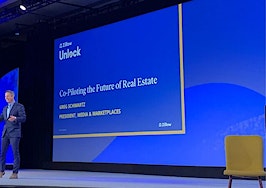It’s a wild time for agent compensation. On the one hand, there are flat-free brokerages and companies like Redfin that promise to return some of their commissions to buyers. On the other, multiple ongoing lawsuits are challenging compensation structures that have been in place for decades.
In this fraught environment, The New York Times suggested last week that consumers strike out on their own and ask agents to work for an hourly rate rather than on commission. The Times piece, by economist Justin Wolfers, suggested that asking for an hourly rate might be one way for consumers to get a better deal.

J. Phillip Faranda
In an effort to figure out if this idea would actually work for agents and their clients, Inman reached out to a number of real estate professionals. Perhaps surprisingly, most were actually open to the idea of alternative compensation models.
But they also raised a recurring caveat: Consumers don’t actually want to pay agents an hourly rate.
“The established model is what consumers want,” J. Philip Faranda, owner of an eponymous real estate firm in New York state, said. “They just won’t admit it, in the same way that a guy might refer to his wife as the ‘old ball and chain,’ but would never file for divorce.”
Faranda told Inman that he makes a standing offer to all his clients: He’ll charge them half of his normal fee, but they have to pay up front. He said that he does hundreds of transactions a year and has been in the industry for decades, and in all that time no one has ever taken him up on the offer.
The reason consumers prefer conventional commissions, Faranda argued, is that they force the agent to shoulder all the risk. Consumers, on the other hand, get to move through the process relatively risk free.
“The seller lists their house and knows that they don’t pay a dime unless they sell,” Faranda said. “If they paid up front they now have skin in the game.”
Faranda’s comments highlight the significant amount of uncertainty that exists in real estate, and which the Times‘ more purely economic analysis largely glosses over. In the Times scenario, the agent ended up charging $120 per hour, which added up to nearly $7,000 by the time the deal closed.
That means the agent spent about 58 hours on the deal.
But what if, as is fairly common in real estate, the deal had dragged on, potentially for years? Suddenly, the hourly rate might not seem like such a great deal.

Teresa Boardman
Teresa Boardman experienced just such a scenario. She recalled working with a couple who took two and a half years to actually buy a home. Boardman — who also owns her own brokerage — actually said that she is open to the idea of working for an hourly rate, calling the idea “awesome.”
But she added that it might not actually save consumers any money.
“If I would have been paid on a hourly basis for them,” Boardman said, referring to the couple that took years to find a home, “I would have made way more money.”
Like Faranda, Boardman concluded that the inherent risk involved in real estate transactions is part of the reason the current compensation model exists; because some potential transactions might not happen at all, the ones that do go through need to pay enough to sustain the agents involved. Consumers may not like that fact, but they’d like the alternative — paying agents outright — even less.
“I absolutely would offer an hourly service to my clients,” Boardman said. “I would have no problem doing that. But they don’t want to pay us at all.”

Karen Brewer
Karen Brewer, a Sotheby’s agent in Massachusetts, also raised another issue when it comes to commission-based agents opting to take an hourly rate: In many cases, it isn’t just up to them anyway.
“I would have to talk to my broker, to tell you the truth,” she told Inman. “I work for a large company, so this is not mom-and-pop real estate. I’d have to clear it. I don’t think you could do that in a vacuum.”
Her point — which is also something that wasn’t really explored in the Times piece — was that commissions are actually shared by multiple parties who are involved in a transaction. And agents can’t singlehandedly change entire financial ecosystems.
“The infantry can’t be telling the generals what to do,” she added.
Brewer did say that there are shortcomings to the existing compensation model that dominates real estate. And she added that in theory she’d be open to getting paid up front for her services, much the way people in other professions charge consultation fees.
Still, some of the alternative compensation models have failed to gain traction because in the end they’re “not in anybody’s best interest,” Brewer said.
Significantly, while both Boardman and Brewer expressed some openness to the idea of up front pay, they also said no client has ever actually approached them about taking such an arraignment. That could of course be because most consumers don’t know they could pitch alternatives to agents, but Faranda argued that in fact the legacy model is growing because it gives consumers precisely what they want.
“Millennials use legacy brokerages more than their parents did,” Faranda said. “It’s what consumers want. This is a market driven thing. No one can figure out a software program that will make a consumer want to share the risk.”

Bill Wendel
Some real estate professionals, however, have managed to make alternative models work. Bill Wendel, for example, founded the Real Estate Café in 1995 to give consumers direct access to the multiple listing service. Wendel pioneered a kind of à la carte pricing model that only charged consumers for the specific services or time that they used.
Given his background in technology-oriented real estate, it’s no surprise that Wendel sees significant disruption on the horizon. Data may better match up sellers and buyers in the future, he said, and commissions are going to be “pulled apart.” And do-it-yourself consumers will push the industry’s envelope.
But Wendel also expressed skepticism that, in the here and now, consumers calling up agents and asking for hourly rates is a viable widespread trend.
“I think it’s going to be a rare buyer who asks for that,” he said. “And it’s going to be a rare agent who knows what to do with it.”













